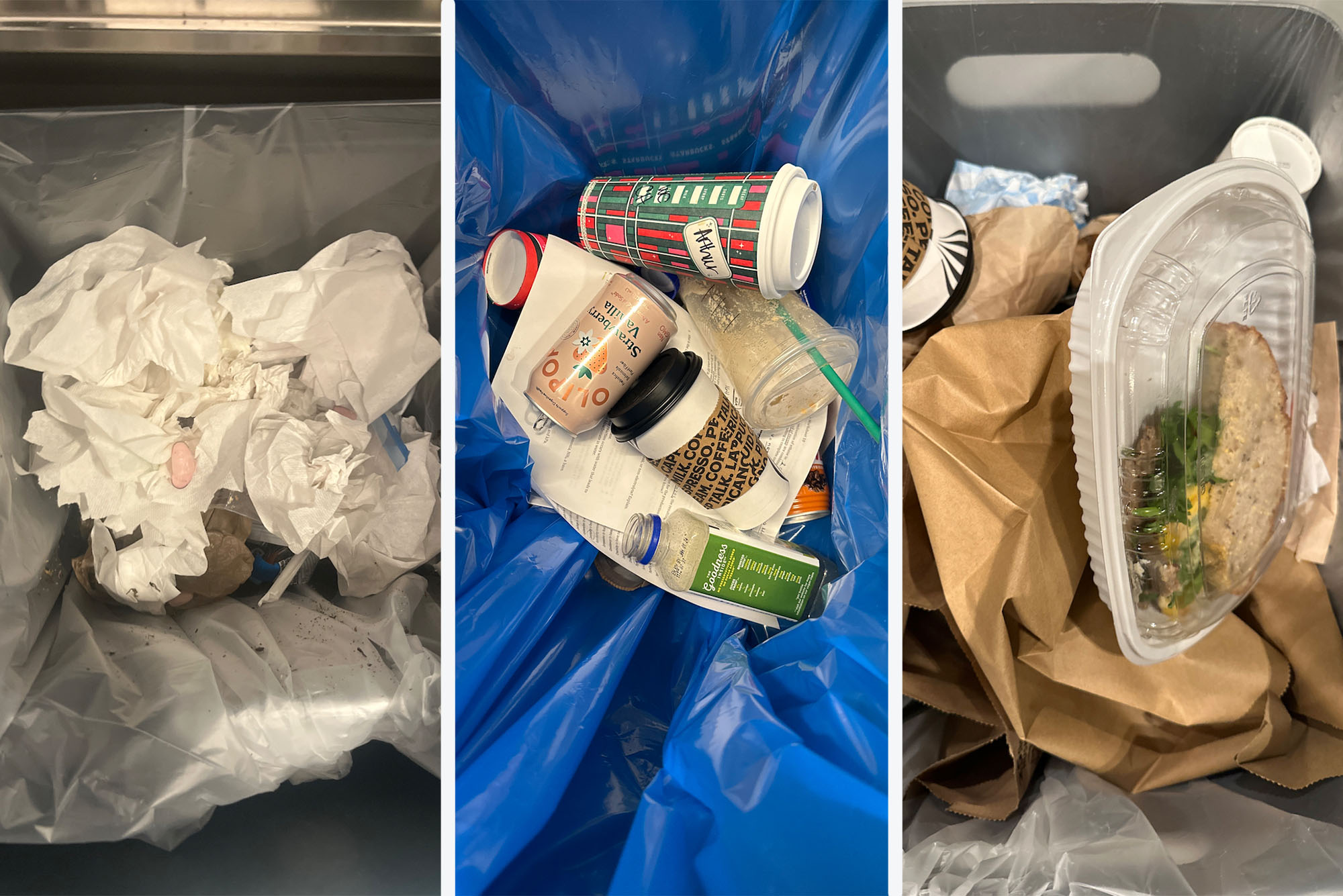As We Celebrate Earth Day, a Reminder of What Cannot Be Recycled at BU

Paper towels and napkins, coffee cups, and food waste are among the non-recyclables that contaminate BU recycling bins. Photos courtesy of BU Sustainability
As We Celebrate Earth Day, a Reminder of What Cannot Be Recycled at BU
Well-meaning “wishcycling” actually contaminates the recycling stream
The road to pollution hell is paved with good “wishcyling” intentions. The word refers to recycling stuff because you want to be responsible—but the items actually are not recyclable and should be thrown away or composted instead. Wishcycling, alas, defeats the eco-point.
It “only contaminates items that are recyclable and makes them trash,” HuffPost notes. It also imperils recycling facility workers, says Sarah Healey, zero waste manager at BU Sustainability. “Although there are lots of machines that help sort materials, the process still requires people to operate them. One notable safety hazard involves film plastics, which can wrap around and jam up the equipment. This forces workers to climb inside the machines to cut it out.”
And leaving food scraps in recycled containers can draw rodents to recycling facilities, says Healey.
So what cannot be recycled at BU? “We get questions on it every single day,” says Sam Moller, Sustainability’s assistant communications director. Understandably so: marking products as recyclable is a loosey-goosey affair. Most plastics carry the familiar resin code, the “chasing arrows triangle with a number in it,” Healey says. But that number merely indicates the plastic type the object is made from, not whether the plastic is recyclable. “There is very little regulation or policy around labeling an object as recyclable, which leads to a lot of greenwashing,” she says.
You should pay attention to your plastic’s shape, not its number. “Your bottles, tubs, jugs, and lids from your household are all recyclable, regardless of the number on them,” says Healey. She suggests consulting Recyclopedia, and for Massachusetts residents particularly, these FAQs about commonwealth practices.
Meanwhile, in time for Earth Day, here are commonly mis-cycled items at BU.
Hot coffee cups
“The biggest problem by far,” Moller says. They go in the trash; only the cardboard sleeve can be recycled.
Compostable plastic products
Trash them, don’t compost them. “Compostable plastics are one of the largest greenwashing issues we see,” Healey says. They’re typically made with a corn-derived material that requires special composting at an industrial facility. The problem is that those facilities are few, she says, and those in Massachusetts can’t manage the high volume of plastics generated at BU.
There’s an exception to the can’t-be-composted rule: compostable plastic liner bags, “which are acceptable at almost every compost facility,” she says. “This is because the liner bags make composting easier, eliminate the ick factor, and result in high volumes of food waste going to the compost facilities.”
Used napkins and paper towels
These should be composted, not recycled, along with food waste. “BU Dining collects food waste from all of the facilities they operate, as well as their catering on campus,” Healey says. Additionally, there are numerous on-campus composting sites, including:
- All waste stations in the Center for Computing & Data Sciences
- Agganis Arena, 925 Commonwealth Ave.
- Metropolitan College’s Gastronomy Program, 808 Commonwealth Ave.
- The stores at 700 Commonwealth Ave., near Warren Towers
- The Medical Student Residence, 815 Albany St., on the Medical Campus
- Chequers, the basement café in the Medical Campus Instructional (L) Building, 72 East Concord St.
Film plastic
Toss in the trash.
Wax paper from food stores
See film plastic, above.
Amazon mailers and similar packages
“Amazon mailers are trash,” Healey says, unless you can take them to a drop-off recycling facility. “Star Market [1065 Commonwealth Ave.] is the one that is closest to campus.”
Black plastic
The color makes it garbage.
“In a recycling facility,” Healey says, “all of the recyclables from the truck are dumped onto a large floor space, and from there they are loaded onto a conveyor belt. There, they’re exposed to optical sorters—“machines that use light to read the ‘DNA’ of the plastic. The process uses light refraction to determine plastics, and bursts of air to sort the items on the conveyor belt.” But since the conveyor belts are black, she says, “black plastic blends in, and the optical sorters cannot differentiate the plastic from the belt. As a result, the black plastic gets mixed up with different types of plastic and needs to be sorted out.”
Plastic food containers with food in them
These can be recycled, but only if you clean out food remnants first.

Comments & Discussion
Boston University moderates comments to facilitate an informed, substantive, civil conversation. Abusive, profane, self-promotional, misleading, incoherent or off-topic comments will be rejected. Moderators are staffed during regular business hours (EST) and can only accept comments written in English. Statistics or facts must include a citation or a link to the citation.